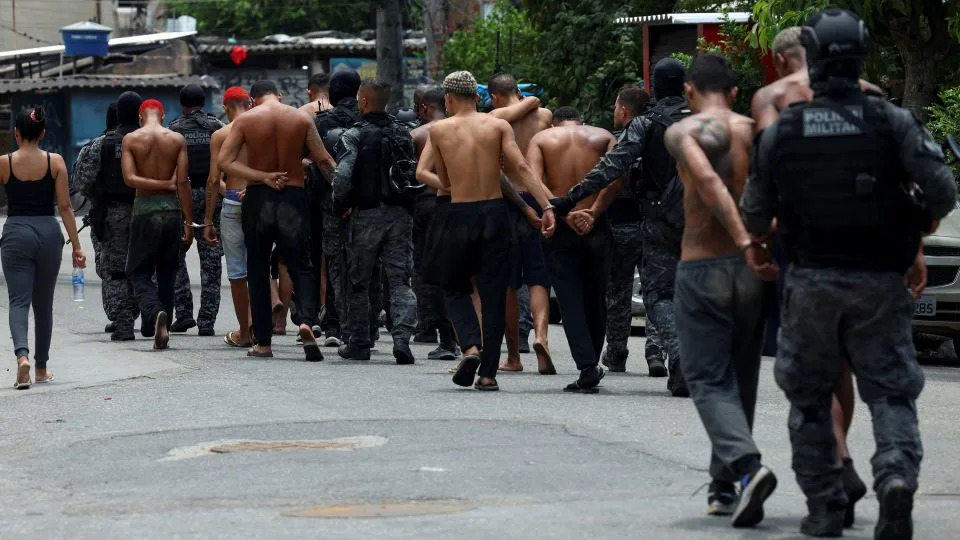
Rio’s Largest Police Raid: Shocking Death Toll Hits 64
In what has become one of the deadliest police operations in Brazilian history, a recent raid in Rio de Janeiro has left 64 people dead, highlighting the escalating violence and pressure on law enforcement to tackle powerful criminal organizations. This operation, conducted on a day that shocked both citizens and officials alike, has raised significant concerns about the methods used by police and the ramifications of such intense confrontations.
A Day of Chaos: What Happened?
On that fateful day, fierce clashes erupted throughout Rio de Janeiro, particularly impacting neighborhoods already riddled with violence and crime. Residents found themselves in the crossfire, as the Brazilian police, struggling to maintain control, launched an aggressive raid aimed at dismantling the infamous Red Command gang. Armed with high-caliber weapons and drones capable of dropping explosives, the gang retaliated with unexpected ferocity, turning the area into a battlefield.
Witnesses described a scene filled with chaos and fear. I could hear gunfire everywhere. It was terrifying, said Maria Silva, a local resident. We thought we were going to die. The violence surged through the streets of Rio, prompting many to seek refuge in their homes while others fled from the horror. The tension and dread that filled the air served as a stark reminder of the deadly reality many citizens face daily amid Brazil’s ongoing fight against organized crime.
Understanding the Red Command Gang
The Red Command, known in Portuguese as Comando Vermelho, is one of Brazil’s most notorious criminal organizations, with deep roots in the drug trade. Established in the late 1970s, this gang has significantly influenced Rio’s socio-political landscape, perpetuating cycles of violence and corruption. Their ability to adapt and respond to law enforcement efforts has made them a formidable adversary, employing innovative tactics such as drone warfare.
This incident underscores the escalating tension between law enforcement and gangs in urban Brazil. As organized crime continues to evolve, so too does the necessity for police to adopt new strategies. However, the question remains: at what cost? With 64 deaths reported in this raid alone, the consequences of such operations are immense, leading to debates about morality and effectiveness in combating crime.
The Legacy of Violence in Rio de Janeiro
The recent police raid serves as a grim reminder of the legacy of violence that has plagued Rio de Janeiro for decades. The state’s struggle with crime has left citizens caught in a cycle of fear, loss, and uncertainty. Beyond the staggering death toll, countless lives have been irrevocably changed.
Families of the deceased are grieving and looking for answers. Jorge Alves, whose brother was among those killed, called for justice and transparency. “We need to understand what happened. Why did so many have to die? Was there another way?” he questioned. Such sentiments echo the thoughts of many who feel that aggressive police tactics often do more harm than good—often leading to tragic outcomes instead of actual reform.
The Global Response to Brazil’s Police Violence
This tragic event has gained international attention, with human rights organizations urging the Brazilian government to reconsider its approach to policing. Amnesty International and Human Rights Watch have issued statements advocating for reforms, emphasizing the need for accountability and an end to excessive force. These organizations argue that comprehensive training for police and community engagement are pivotal steps necessary for any sustainable resolution.
City officials, faced with mounting pressure, must balance public safety with civil liberties. Governor Claudio Castro described the raid as “a necessary move,” but he also called for investigations into the methods employed during the operation. This duality of perspective illustrates the complexities surrounding crime and punishment in Brazil, as law enforcement must navigate a challenging landscape riddled with both danger and desperation.
Conclusion: The Path Ahead
As Brazil grapples with the fallout from this bloody raid, the focus must remain on finding solutions that prioritize human life above all else. The shocking death toll of 64 from the largest police raid in Rio’s history should serve as a catalyst for change. Community engagement, transparency, and humane policing practices must be at the forefront of discussions as the nation seeks to address the root causes of crime without sacrificing the safety of its citizens.
In reflecting on this tragic event, it’s clear that the journey towards a safer Brazil is fraught with challenges. Achieving this requires more than just law enforcement’s heavy hand; it calls for an understanding heart and a commitment to reforming a broken system. Only then can Rio de Janeiro hope to break free from the chains of violence, fostering a community where safety and peace are not just distant dreams, but achievable realities.


